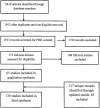Personal health records: a scoping review
- PMID: 21672914
- PMCID: PMC3128401
- DOI: 10.1136/amiajnl-2011-000105
Personal health records: a scoping review
Abstract
Electronic personal health record systems (PHRs) support patient centered healthcare by making medical records and other relevant information accessible to patients, thus assisting patients in health self-management. We reviewed the literature on PHRs including design, functionality, implementation, applications, outcomes, and benefits. We found that, because primary care physicians play a key role in patient health, PHRs are likely to be linked to physician electronic medical record systems, so PHR adoption is dependent on growth in electronic medical record adoption. Many PHR systems are physician-oriented, and do not include patient-oriented functionalities. These must be provided to support self-management and disease prevention if improvements in health outcomes are to be expected. Differences in patient motivation to use PHRs exist, but an overall low adoption rate is to be expected, except for the disabled, chronically ill, or caregivers for the elderly. Finally, trials of PHR effectiveness and sustainability for patient self-management are needed.
Conflict of interest statement
Figures
References
-
- Bliemel M, Hassanein K. Consumer satisfaction with online health information retrieval: a model and empirical study. e-Service J 2007;5:53–83
-
- Rideout V, Neuman T, Kitchman M, et al. e-Health and the Elderly: How Seniors Use the Internet for Health Information. Menlo Park, CA: Kaiser Family Foundation, 2005
-
- Taylor H. Two in five adults keep personal or family health records and almost everybody thinks this is a good idea. Health Care News 2004
Publication types
MeSH terms
Grants and funding
LinkOut - more resources
Full Text Sources
Medical


